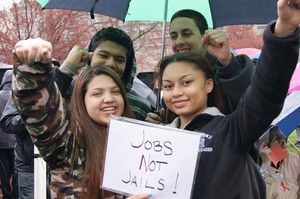Getting out of jail doesn’t always mean an individual is free to pursue a future. The question over criminal record always stands out on job applications and many argue it has kept them from getting their foot in the door for that first interview.
For a group of Massachusetts advocates, that wasn’t good enough. Ex-Prisoners and Prisoners Organizing for Community Advancement (E.P.O.C.A.) says that having a criminal record can decrease the person’s chance of being called for an interview by as much as 67 percent. The organization says “overuse and misuse” of this information, not only by employers but also by schools and landlords, has trapped millions of people in poverty and desperation.
In 2010, E.P.O.C.A. lobbied the Massachusetts state legislature to curtail the dissemination of criminal offender record information and credits the Presbyterian Committee on the Self-Development of People for funding the initiative. The result was a new state law many argue is providing opportunity and self-sufficiency for millions.

E.P.O.C.A. member Donnell Wright testifies at the public hearing of the Justice Reinvestment Act at the Massachusetts State House of Representatives. —Photo Courtesy of E.P.O.C.A.
“SDOP was a staunch supporter and helped us win our next campaign victory in 2012. Our new state law reforms several programs including Children in Need of Services (CHINS),” said Corinne Rhodes, director of Development and Communications for E.P.O.C.A. “For almost 40 years, the CHINS system has criminalized young people who need help, not punishment, a probation officer and the lasting stigma of a court record. Approximately 8,000 children, youth and their families across the state annually receive assistance and the services they need.”
E.P.O.C.A’s “Jobs Not Jails” campaign now has 136 organizations and activists working to divert tax dollars from building prisons and re-directing the funds to help create jobs in high-crime/low income communities.
“The members of the Presbyterian Committee on the Self-Development of People are proud of our partnership with E.P.O.C.A. and the strides they have made in breaking the chains of mass incarceration,” said Cynthia White, coordinator for SDOP. “There is no question this social phenomenon of locking people up is having a tremendous and negative impact on families, communities and the society at large. The privatizing of prison and its huge economic impact for private industry must be re-examined.”
E.P.O.C.A. says it continues to build momentum with its movement to end mass incarceration and fund job creation.
“One of our primary objectives is to put these lessons into practice, to perfect our ability to create ‘moments of the whirlwind’ in which thousands of people take constructive action together and bring a wholesale shift in public attention toward mass incarceration and the economy,” said Rhodes.
Since 1970, SDOP has awarded more than $100 million to communities in 67 countries, including the U.S. An estimated 5,600 projects have received grant support from SDOP.
-----
More information on SDOP is available at the Self-Development of People web page. You can also support projects by giving to the One Great Hour of Sharing.

